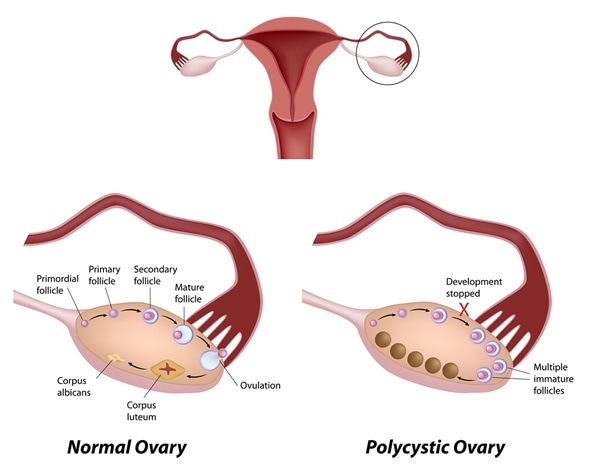Polycystic ovary syndrome (PCOS) is a common health condition in women that involves irregular function of the ovaries. There are three key features of the condition, and the presence of any two of the following symptoms may lead to a diagnosis of PCOS:
- Absent or sporadic ovulation, resulting in irregular periods
- High levels of androgenic hormones such as testosterone
- Enlargement of the ovaries and many follicles that surround the eggs (polycystic ovaries)

Normal ovarian cycle and Polycystic ovary syndrome - Image Copyright: Alila Medical Media / Shutterstock
Polycystic ovaries contain many follicles up to 0.3 inches (8 mm) in diameter, which can interrupt the release of the egg and inhibit ovulation.
Cause
Although the exact cause of PCOS is not known, there are several factors that are associated with the condition. It is closely linked to high levels of hormones such as insulin and testosterone, but it is not clear if this is a cause or an effect of the condition. Additionally, it appears to run in some families, which suggests that there may be a genetic link in the pathogenesis of the condition.
Signs and Symptoms
The signs and symptoms of PCOS usually become evident in teenage years around the age of menarche, the first menstrual period. Symptoms may include
- Irregular or absence of menstrual periods
- Excessive hair growth on the face, chest, back, or buttocks
- Thinning or loss of hair from the head
- Oily skin and acne
- Dark or thickened skin on the neck, arms, breasts, and thighs
- Weight gain
- Anxiety and depression
However, some women may not report symptoms of PCOS until they wish to start a family and have difficulty getting pregnant.
Complications
Women with PCOS are more likely to develop other health conditions later in life, such as
- Type 2 diabetes mellitus
- High cholesterol
- Hypertension
- Heart disease
- Stroke
- Endometrial cancer
Treatment
There is no cure for PCOS. However, there are several management strategies that can help to reduce the impact of symptoms and the likelihood of complications later in life.
Firstly, it is important for women with PCOS to focus on living a healthy lifestyle with a nutritious diet and sufficient physical activity, particularly if they are overweight or obese. This is important because excessive body weight can increase resistance to insulin in the body and precipitate or worsen symptoms of PCOS.
There are medications available to manage specific symptoms, such as hirsutism and irregular menstrual periods. For example, oral contraceptive pills can help normalize the hormonal levels and allow women with PCOS to have a regular period. This is also helpful to shed the endometrial lining and reduce the risk of endometrial cancer later in life.
For women with PCOS who wish to conceive a child, medications such as clomifene can help to encourage ovulation and allow a woman to become pregnant. However, some women may require laparoscopic ovarian drilling (LOD), which is a surgical procedure to destroy abnormal cells in the ovaries, or in-vitro fertilization (IVF) to conceive.
Epidemiology
The exact number of women with PCOS is not known, as some women with the condition may not seek medical advice about mild symptoms. However, it is estimated that PCOS may affect between 1 in 5 women, although many affected women are asymptomatic.
References
Further Reading
Last Updated: Jan 26, 2021